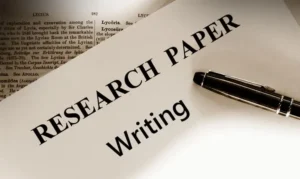Embarking on the task of writing a research paper might seem tough, but it’s full of challenges and rewards. This guide is here to help you through the dos and don’ts that can really make a difference in your paper’s quality and success. Whether you’re a pro at academic stuff or just starting out, these tips will guide you through the whole process of making a strong and smart paper.
What Is a Research Paper?

A Research Paper is a type of academic writing that provides an in-depth analysis, evaluation, or interpretation of a single topic, based on empirical evidence. It goes beyond just expressing your thoughts; instead, it’s about demonstrating what you’ve discovered through solid evidence. Imagine it as your opportunity to showcase what you’ve learned about a subject in a structured and detailed manner. You gather information, analyze it, and present your findings in a way that adds to the existing knowledge on the topic.
In simpler terms, consider mastering how to write a research paper as akin to narrating a story. It involves weaving a narrative, but with a crucial addition—incorporating facts and evidence to substantiate your points. So, when you set out to learn how to write a research paper, you’re essentially becoming the storyteller, guiding your readers through an intriguing journey that showcases your exploration and comprehension of a particular subject. It transcends mere expression of thoughts; it’s about constructing a narrative fortified by substantial evidence.
Now armed with this perspective on how to write a research paper, let’s delve into the blog to ensure you’re on the right path.

The Do’s:
-
Understand the Assignment:
Before setting pen to paper, take the time to thoroughly comprehend the requirements and expectations of your research paper assignment. This foundational step ensures you are on the right track from the outset.
-
Choose a Strong Topic:
The significance of a well-chosen topic cannot be overstated. Opt for a subject that not only aligns with your interests but is also relevant and has ample available sources for research. A strong topic sets the stage for a robust research paper.
-
Create a Strong Thesis Statement:
Your thesis statement is the compass that guides your entire paper. Clearly articulate the main argument or purpose of your research in a concise manner. A strong thesis statement provides a roadmap for both you and your readers.
-
Conduct Thorough Research:
The backbone of any research paper is the evidence that supports your arguments. Utilize credible sources and ensure a diverse range of perspectives. Avoid the pitfall of relying on a limited number of sources, as this can compromise the depth and validity of your research.
-
Organize Your Thoughts:
Creating a well-structured outline is a key step in organizing your ideas logically. A clear roadmap not only facilitates the writing process but also enhances the flow of information in your paper. Ensure a seamless transition between sections to maintain reader engagement.
-
Cite Sources Properly:
Citing sources accurately is a non-negotiable aspect of academic writing. Choose a citation style (APA, MLA, Chicago, etc.) and adhere to it consistently throughout your paper. Proper citation not only avoids plagiarism but also lends credibility to your work.
-
Write Clearly and Concisely:
Effective communication is paramount in research papers. Use clear and concise language to convey your ideas. Avoid unnecessary jargon or overly complex sentences that may alienate your audience. Aim for a writing style that is accessible to a broad readership.
-
Revise and Edit:
The importance of revising and editing cannot be overstated. Proofread your paper for grammar, spelling, and punctuation errors. Additionally, focus on enhancing clarity, coherence, and the overall quality of your writing. A polished paper reflects your commitment to excellence.
-
Follow Formatting Guidelines:
Formatting guidelines provide a framework for presenting your research. Adhere to the specifications provided by your instructor or the chosen citation style. Failure to do so may result in unnecessary point deductions.
-
Seek Feedback:
Writing is an iterative process, and seeking feedback is a crucial step in refining your work. Share your paper with peers, mentors, or writing centers to gain valuable insights. Constructive criticism can significantly elevate the quality of your research paper.
The Don’ts:
-
Procrastinate:
Procrastination is the enemy of quality research. Avoid the temptation to delay the start of your project. Early engagement allows for ample time to conduct thorough research, refine your arguments, and produce a polished final product.
-
Plagiarize:
Plagiarism is a cardinal sin in academia. Never copy someone else’s work without proper attribution. Embrace the principles of academic integrity by giving credit where it is due. Plagiarism not only jeopardizes your academic standing but also undermines the integrity of your research.
-
Use Uncritical Sources:
The credibility of your research hinges on the quality of your sources. Avoid relying on unreliable or biased materials. Peer-reviewed articles, books, and reputable websites should form the foundation of your research, ensuring the robustness of your arguments.
-
Overuse Quotations:
While quotations can lend authority to your arguments, overusing them detracts from your original contribution. Strike a balance between incorporating relevant quotations and showcasing your own analysis and interpretation. Your voice should be the primary driver of your paper.
-
Ignore Formatting Guidelines:
Formatting guidelines exist for a reason. Ignoring them can result in avoidable point deductions. Pay meticulous attention to details such as margins, font size, and citation style. Consistency in formatting enhances the professionalism of your research paper.
-
Use Ambiguous Language:
Clarity is paramount in academic writing. Avoid ambiguous or vague language that may confuse your readers. Clearly define concepts and terms, especially if they are specialized or technical. A lucid writing style ensures that your ideas are effectively communicated.
-
Neglect the Conclusion:
The conclusion is not a mere formality; it is your last opportunity to leave a lasting impression. Summarize your main points, reinforce your thesis, and provide a sense of closure. Avoid introducing new information in the conclusion, as this can disorient your readers.
-
Assume Your Reader Knows Everything:
Every reader comes to your paper with a unique level of knowledge. Do not assume that your audience possesses the same understanding of your subject matter. Clearly explain concepts and terms to ensure accessibility for a broad readership.
-
Rely on Spellcheck Alone:
Spellcheck is a useful tool, but it is not foolproof. Relying solely on spellcheck may overlook subtle errors. Take the time to proofread your paper thoroughly and, if possible, enlist the help of others to ensure a comprehensive review.
-
Forget to Take Breaks:
The process of writing a research paper can be mentally taxing. Neglecting breaks may lead to burnout and, consequently, a decline in the quality of your work. Schedule regular breaks to refresh your mind and maintain optimal productivity.

Frequently Asked Questions (FAQs)
-
Why is mastering the art of research paper writing important?
A: Mastering this art ensures your ideas are communicated effectively, contributing to academic and professional success.
-
What’s the significance of planning in research paper writing?
A: Planning ensures a structured approach, preventing common pitfalls like procrastination and disorganization.
-
How do I avoid plagiarism in my research paper?
A: Cite sources accurately, use quotation marks for direct quotes, and reference all borrowed ideas to avoid plagiarism.
-
Why is revising crucial in the research paper writing process?
A: Revising enhances clarity, coherence, and overall quality, ensuring your paper is polished and well-articulated.
-
How can I balance incorporating quotes and maintaining my voice?
A: Select quotes judiciously, ensuring they support and enhance your narrative without overshadowing your original analysis.
-
What role does feedback play in improving my research paper?
A: Seeking feedback from peers or mentors provides valuable insights, helping refine your work and enhance its overall quality.
-
Can I use a research paper writing service for assistance?
A: While getting assistance is fine, ensure it aligns with ethical standards and contributes to your understanding of the subject.
-
How can I overcome writer’s block during research paper writing?
A: Take breaks, switch tasks, or revisit your outline to rejuvenate your creativity and overcome writer’s block effectively.
-
Are there specific formatting guidelines I should follow?
A: Yes, adhere to the formatting guidelines provided by your instructor or the citation style you are using to maintain professionalism.
-
How do I ensure my research paper aligns with academic research ethics?
A: Prioritize honesty, respect participant confidentiality, and cite sources diligently to uphold ethical standards in academic research.
Conclusion
Achieving proficiency in the craft of research paper writing necessitates a dedication to excellence and a strategic approach. By following these do’s and don’ts, you can confidently navigate the complexities of academic research. Keep in mind, that a well-crafted research paper not only highlights your intellectual abilities but also makes a meaningful contribution to your academic and professional path.
Additionally, for those seeking additional assistance or aiming to enhance their writing experience, consider exploring a reputable research paper writing service. Such services can provide valuable support in refining your research paper and ensuring that it meets the highest standards of quality and academic integrity.


